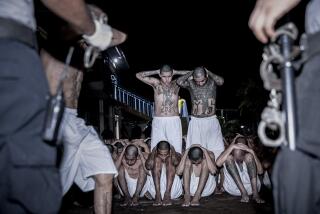S. Africa’s Black Youth Often Left Behind : Legacy: Despite end of apartheid, there is still little information on who and where the needy kids are, and less money and expertise to help them.
- Share via
JOHANNESBURG, South Africa — Like many young blacks, Jackson Molefe skipped school often to protest and fight against apartheid.
The African National Congress he dreamed of joining as a child now governs the country, but the end of apartheid has brought little change to his life.
Molefe, 17, and other homeless young people live in an abandoned office building in one of Johannesburg’s seedier neighborhoods, sleeping on moldy blankets amid an ever-present stench of urine.
“I didn’t ask for this,” said Molefe, who took to the streets when his parents died in political violence four years ago. “How can you give so much to something and then have nothing?”
Few people have answers on how to help millions of children facing hardship in post-apartheid South Africa. Their torments take many forms--physical and sexual abuse, hunger, homelessness, abandonment. Police estimate that crimes against children reached 20,000 in 1994, compared to 16,809 the previous year.
The new government, chosen last April in the nation’s first all-race election, has little information on who and where the needy children are, and even less money and expertise to help them.
“We are in the process of discussing what the needs of children are in this country,” said Welfare Minister Abe Williams. “But one has to keep in mind that the government is trying to accommodate everyone.”
Some of the problems occur throughout the world, such as shocking child abuse cases that cross all racial and social barriers. Reaction to one case--a 4-year-old white girl found covered with bruises and herpes sores--included calls from welfare groups for castration as a penalty for child abusers.
Other troubles are the legacy of apartheid--the failure of successive white governments to address the needs of the black majority, and the inability of impoverished blacks to take care of their own.
Under apartheid, white rulers spent many times more per child educating and caring for whites, leaving black children with poor services and schools. Today, many black children lack birth certificates, identification or parents to contact.
Molefe has looked for work, even asking the ANC, which once advocated student strikes that disrupted his schooling. Without an education he had little chance.
“The anti-apartheid struggle made an indelible mark on children in South Africa,” said Aubrey Matlole, a black teacher. “What will happen to the thousands of children who fought for liberation but still remained chained by circumstances?”
President Nelson Mandela’s government has so far focused on broad solutions to social ills in hopes of improving living conditions for millions of poor blacks. Included in early programs were free health care for children and pregnant women, and a nutrition program providing food for black schoolchildren.
Mandela also put up $42,500 of his own money for a special fund for street children. His government wants to end the practice of imprisoning youths under age 18. More than 12,000 children, virtually all of them black, were in prison in 1994, some forced to share cells with adult inmates.
One obstacle to helping children is a lack of information.
A report late last year by the United Nations Children’s Fund lacked statistics for such categories as health services, sanitation and school enrollment, listing them as unavailable.
“The greatest difficulty in South Africa is the disparity of information,” said Ian MacLeod, a UNICEF spokesman. “We kind of have a general idea where the more disadvantaged areas are, but we need hard figures which we just don’t have.”
The Welfare Ministry estimates more than 15,000 children live on the streets, some orphaned by political violence, others abandoned by troubled families and still others runaways.
Soup kitchens and churches provide food to displaced children, while generous doctors sometimes offer medical treatment.
More to Read
Sign up for Essential California
The most important California stories and recommendations in your inbox every morning.
You may occasionally receive promotional content from the Los Angeles Times.













